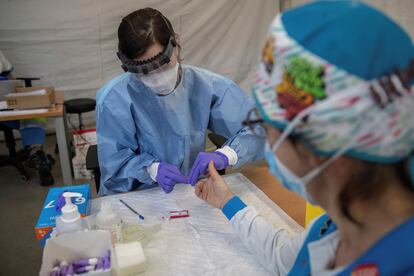Madrid government overstates reliability of 100,000 coronavirus tests for health workers
An internal document says that the products are much less accurate than the regional premier has claimed, with one in three results false positives

An internal document from the Madrid health department has revealed that 100,000 fast coronavirus tests destined for health workers are not as reliable as the regional government claimed them to be.
The premier of Madrid, Isabel Díaz Ayuso from the conservative Popular Party (PP), said in April that the tests had a sensitivity rate of 92%, and presented the purchase as an example of how well the regional government was managing the coronavirus crisis in comparison to the central government, which has encountered several problems with defective tests. “We have tested them [the fast diagnostic tests] with a microbiology study in La Paz hospital, and they give us more sensitivity and confidence than [the tests] the government has given us,” Díaz Ayuso said.
It does not make sense to extend the use of tests with questionable reliabilityRosa Vicente, health secretary of the CSIT union
But a document from the Pharmacy Services of Dirección Asistencial Sureste, an agency that oversees health management issues in southeast Madrid, to which EL PAÍS has had access, indicates the tests only have a sensitivity rate of 79.4%. According to the document, 36% of cases confirmed by the tests are false positives. In another indicator, known as specificity – the percentage of people without antibodies who therefore test negative – the figure is 74%, meaning that one in four cases receive a false positive.
These percentages are far below the figures promised by the Dutch manufacturer Biozek Medical, which claims the tests are between 85% and 100% reliable, depending on the type of antibody and indicator. The Pharmacy Services document is dated in May (but does not specify the date) and states that the study on the reliability of the tests was carried out in a “microbiology laboratory in the region.”
The Madrid regional government, which declined on Tuesday to comment on the issue, aims to use these fast tests on the region’s 86,000 health workers. This decision has been met with resistance from health professionals as well as several hospitals, which doubt the reliability of the tests and argue that more accurate diagnostic methods are needed given the spike of coronavirus infections in the health sector. According to figures from the Spanish Health Ministry, the number of health workers who have contracted Covid-19 has risen nearly 40% in the past two weeks; while almost 44,000 professionals have been affected by the disease in total.
“It does not make sense to extend the use of tests with questionable reliability, nor can they be used to find out epidemiological data, or to modify your behavior in the workplace,” said Rosa Vicente, the health secretary of the CSIT union, which represents public workers in Madrid.
A recent report from the Spanish Association of Infectious Diseases and Clinical Microbiology (SEIMC) recommended against using these type of fast tests on health workers, given that they are not “completely reliable, as has been shown when these methods have been evaluated by the Carlos III Health Institute and collaborating centers.”
The tests don’t have the reliability to diagnose an asymptomatic professionalJosé Miguel Cisneros, head of infectious diseases at Virgen del Roció hospita
José Miguel Cisneros, the head of infectious diseases at Virgen del Rocío hospital in Seville and the former president of SEIMC, explained that the fast tests "can be used for a specific patient in a set situation, but they don’t have the reliability to diagnose an asymptomatic professional.”
Large hospitals in Madrid have decided to carry out their own diagnostic studies with serological tests called Elisa, which are more complex and reliable. This situation has upset the primary healthcare workers, who have demanded the same treatment.
“In the end, the fast tests, which do not give us an understanding of our real state, are only going to be used on us. While well-made serological tests like Elisa, which are more reliable, are the ones being used on the staff of many hospitals,” said a primary care doctor from a health center in the Madrid neighborhood of Vallecas. “We don’t understand why, or what makes us different from the rest of our colleagues.”
The staff at the Ibiza health clinic in Madrid also issued a statement to express their concern over the fast tests. “The evidence is clear: for a study of health professionals, the appropriate test is Elisa.”
English version by Melissa Kitson.
Tu suscripción se está usando en otro dispositivo
¿Quieres añadir otro usuario a tu suscripción?
Si continúas leyendo en este dispositivo, no se podrá leer en el otro.
FlechaTu suscripción se está usando en otro dispositivo y solo puedes acceder a EL PAÍS desde un dispositivo a la vez.
Si quieres compartir tu cuenta, cambia tu suscripción a la modalidad Premium, así podrás añadir otro usuario. Cada uno accederá con su propia cuenta de email, lo que os permitirá personalizar vuestra experiencia en EL PAÍS.
¿Tienes una suscripción de empresa? Accede aquí para contratar más cuentas.
En el caso de no saber quién está usando tu cuenta, te recomendamos cambiar tu contraseña aquí.
Si decides continuar compartiendo tu cuenta, este mensaje se mostrará en tu dispositivo y en el de la otra persona que está usando tu cuenta de forma indefinida, afectando a tu experiencia de lectura. Puedes consultar aquí los términos y condiciones de la suscripción digital.









































